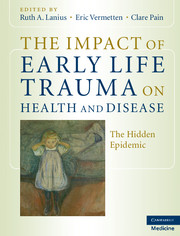Book contents
- The Impact of Early Life Trauma on Health and Disease
- The Impact of Early Life Trauma on Health and Disease
- Copyright page
- Contents
- Contributors
- Foreword
- Acknowledgements
- Section 1 Early life trauma: impact on health and disease
- Chapter 1 The history of early life trauma and abuse from the 1850s to the current time: how the past influences the present
- Chapter 2 Theepidemiology of early childhood trauma
- Chapter 3 Historical themes in the study of recovered and false memories of trauma
- Chapter 4 Early trauma, later outcome: results from longitudinal studies and clinical observations
- Part 1 Synopsis
- Chapter 5 Attachment dysregulation as hidden trauma in infancy: early stress, maternal buffering and psychiatric morbidity in young adulthood
- Chapter 6 Towards a developmental trauma disorder diagnosis for childhood interpersonal trauma
- Chapter 7 Complex adult sequelae of early life exposure to psychological trauma
- Chapter 8 Therelationship of adverse childhood experiences to adult medical disease, psychiatric disorders and sexual behavior: implications for healthcare
- Part 2 Synopsis
- Section 2 Biological approaches to early life trauma
- Section 3 Clinical perspectives: assessment and treatment of trauma spectrum disorders
- Epilogue
- Index
Chapter 5 - Attachment dysregulation as hidden trauma in infancy: early stress, maternal buffering and psychiatric morbidity in young adulthood
from Section 1 - Early life trauma: impact on health and disease
Published online by Cambridge University Press: 03 May 2011
- The Impact of Early Life Trauma on Health and Disease
- The Impact of Early Life Trauma on Health and Disease
- Copyright page
- Contents
- Contributors
- Foreword
- Acknowledgements
- Section 1 Early life trauma: impact on health and disease
- Chapter 1 The history of early life trauma and abuse from the 1850s to the current time: how the past influences the present
- Chapter 2 Theepidemiology of early childhood trauma
- Chapter 3 Historical themes in the study of recovered and false memories of trauma
- Chapter 4 Early trauma, later outcome: results from longitudinal studies and clinical observations
- Part 1 Synopsis
- Chapter 5 Attachment dysregulation as hidden trauma in infancy: early stress, maternal buffering and psychiatric morbidity in young adulthood
- Chapter 6 Towards a developmental trauma disorder diagnosis for childhood interpersonal trauma
- Chapter 7 Complex adult sequelae of early life exposure to psychological trauma
- Chapter 8 Therelationship of adverse childhood experiences to adult medical disease, psychiatric disorders and sexual behavior: implications for healthcare
- Part 2 Synopsis
- Section 2 Biological approaches to early life trauma
- Section 3 Clinical perspectives: assessment and treatment of trauma spectrum disorders
- Epilogue
- Index
Summary
- Type
- Chapter
- Information
- The Impact of Early Life Trauma on Health and DiseaseThe Hidden Epidemic, pp. 48 - 56Publisher: Cambridge University PressPrint publication year: 2010
- 11
- Cited by



